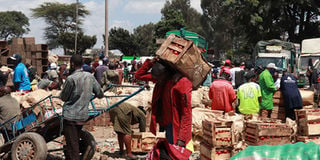The case for reopening our economy

Trading goes on at Muthurwa market in Nairobi in May 25, 2020, as coronavirus cases rise. PHOTO | DENNIS ONSONGO | NATION MEDIA GROUP
What you need to know:
- If the economy is reopened, we can mitigate the worst effects of the lockdown and the curfew by the end of the year.
- It is, therefore, time to crank up the economy back into gear, get people back to work, if we are to avoid a bigger calamity in the very near future.
When you hit rock bottom, the only way is up.
Our economy is on its knees, driven by a pandemic that respects no boundaries. Businesses have all but closed down; millions are out of work and going hungry.
And hungry people, as history has shown, are an angry lot. We don’t want to see a situation where people will be forced to make a choice: die of Covid-19 or hunger. It isn’t really an option.
In boxing parlance, Covid-19 has knocked the air out of our windpipe. We have gone down, bruised, but must get up, dust ourselves off and continue with life.
The economy must be restarted and people given their lives back. That’s why reopening the country for business must be the government’s top priority so that we can get the rhythm of life back.
Estimates place the number of informal sector employees and youth at 70 per cent of Kenya’s population. These are the people who have been hardest hit, and without the benefit of a safety net, we have a time bomb on our hands. It would be catastrophic if it goes off.
The World Bank has predicted a contraction of Kenya’s GDP growth to one and 1.5 per cent this year.
SAFETY MEASURES
A more pessimistic view has placed growth in the negative zone, which would essentially plunge the country into recession. This need not be the case.
Kenyans are a hardworking lot. If the economy is reopened, we can mitigate the worst effects of the lockdown and the curfew by the end of the year.
The World Bank projects that Kenya’s growth would rebound to 5.6 per cent in the medium term if we put in place urgent mitigants against the effects of the pandemic.
The government needs to invest and enforce measures that have proved effective in tackling the spread of the virus: wearing of masks, social distancing and providing water and soap to the disadvantaged. These low-cost measures are already ingrained in us.
The statistics are in our favour. The World Health Organisation (WHO) says Africa has 1.5 per cent of the global reported cases and less than 0.1 per cent of deaths associated with coronavirus. This is less than half the world’s average.
Of course there are naysayers who are quick to point out that our testing capacity is below par, and that the sample sizes are small. Regardless of what the actual figures are, we must act to avert a national disaster.
The main concern is for those people who have taken the most direct hit from the economic contraction; the casual and contract workers.
This is the second month they haven’t earned a penny. Even if the economy is reopened, it would take some time for them to be reabsorbed into their roles.
Yet these people are the pillars of the economy. They support multiple dependants with their meagre earnings. It is clear, therefore, that the negative multiplier effect of their remaining jobless is beyond contemplation.
JOBLESS
When unemployed and unable to feed their families, they become susceptible to opportunistic diseases, putting more strain on them and a healthcare system that is severely tested.
Some countries impacted more severely than Kenya have started relaxing the rules associated with Covid 19.
The US – the worst affected in terms of absolute numbers of cases and deaths – has begun reopening, having felt the strain of an estimated $14 billion daily hit on its economy. Spain and the UK are also partially reopening their economies. South Africa has started doing so.
Other European countries are following suit, gradually relaxing travel movements as it becomes clear that the burden on the people has reached crisis proportions.
It is, therefore, time to crank up the economy back into gear, get people back to work, if we are to avoid a bigger calamity in the very near future: a calamity of a hungry people prowling the streets looking for something, anything, to eat.
Linus Gitahi is the chairman of Diamond Trust Bank Group and former NMG chief executive officer.





